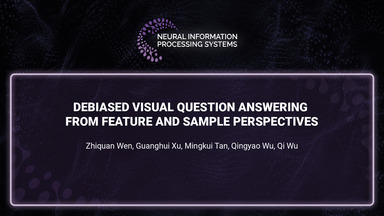Semi-supervised Dense Keypoints using Unlabeled Multiview Images
Dec 6, 2021
Speakers
Zhixuan Yu
Speaker · 0 followers
Haozheng Yu
Speaker · 0 followers
Sujoy Ganguly
Speaker · 0 followers
Hyun Soo Park
Speaker · 0 followers
About
This paper presents a new end-to-end semi-supervised framework to learn a dense keypoint detector using unlabeled multiview images. A key challenge lies in finding the exact correspondences between the dense keypoints in multiple views since the inverse of keypoint mapping can be neither analytically derived nor differentiated. This limits applying existing multiview supervision approaches on sparse keypoint detection that rely on the exact correspondences. To address this challenge, we derive a new probabilistic epipolar constraint that encodes the two desired properties. (1) Soft correspondence: we define a matchability, which measures a likelihood of a point matching to the other image's corresponding point, thus relaxing the exact correspondences' requirement. (2) Geometric consistency: every point in the continuous correspondence fields must satisfy the multiview consistency collectively. We formulate a probabilistic epipolar constraint using a weighted average of epipolar errors through the matchability thereby generalizing the point-to-point geometric error to the field-to-field geometric error. This generalization facilitates learning a geometrically coherent dense keypoint detection model by utilizing a large number of unlabeled multiview images. Additionally, to prevent degenerative cases, we employ a distillation-based regularization by using a pretrained model. Finally, we design a new neural network architecture, made of twin networks, that effectively minimizes the probabilistic epipolar errors of all possible correspondences between two view images by building affinity matrices. Our method shows superior performance compared to existing methods, including non-differentiable bootstrapping in terms of keypoint accuracy, multiview consistency, and 3D reconstruction accuracy.This paper presents a new end-to-end semi-supervised framework to learn a dense keypoint detector using unlabeled multiview images. A key challenge lies in finding the exact correspondences between the dense keypoints in multiple views since the inverse of keypoint mapping can be neither analytically derived nor differentiated. This limits applying existing multiview supervision approaches on sparse keypoint detection that rely on the exact correspondences. To address this challenge, we derive a…
Organizer
NeurIPS 2021
Account · 1.9k followers
About NeurIPS 2021
Neural Information Processing Systems (NeurIPS) is a multi-track machine learning and computational neuroscience conference that includes invited talks, demonstrations, symposia and oral and poster presentations of refereed papers. Following the conference, there are workshops which provide a less formal setting.
Like the format? Trust SlidesLive to capture your next event!
Professional recording and live streaming, delivered globally.
Sharing
Recommended Videos
Presentations on similar topic, category or speaker
Smoothness Matrices Beat Smoothness Constants: Better Communication Compression Techniques for Distributed Optimization
Watch later
Total of 0 viewers voted for saving the presentation to eternal vault which is 0.0%
Debiased Visual Question Answering from Feature and Sample Perspectives
Watch later
Zhiquan Wen, …
Total of 0 viewers voted for saving the presentation to eternal vault which is 0.0%
Online and Offline Reinforcement Learning by Planning with a Learned Model
Watch later
Total of 0 viewers voted for saving the presentation to eternal vault which is 0.0%
On the Approximation of Heterogeneous Cooperative Multi-agent Reinforcement Learning (MARL) via Mean-Field Control (MFC)
Watch later
W. U. Mondal, …
Total of 0 viewers voted for saving the presentation to eternal vault which is 0.0%
Near-Optimal Offline Reinforcement Learning via Double Variance Reduction
Watch later
Ming Yin, …
Total of 0 viewers voted for saving the presentation to eternal vault which is 0.0%
Low-Dimensional Structure in the Space of Language Representations is Reflected in Brain Responses
Watch later
RJ Antonello, …
Total of 0 viewers voted for saving the presentation to eternal vault which is 0.0%





